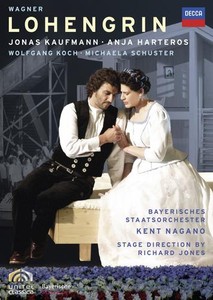|
|
|
|
|
|
|
|
| Gramophone UK, September 2010 |
|
John Steane |
The bad and THE GOOD
|
|
A Lohengrin to hear if not to see |
|
|
 Lohengrin
is a drama of polarities, the good and the bad. So it is in this
performance of the opera, where Jonas Kaufmann’s Lohengrin is very good
and Richard Jones’s production is very bad. That is reflected in the
critical conflict — to recommend it or not. It seemed at first that the
visual element was such a liability as to warrant rejection; then it
became clear that Kaufmann deserves to be seen as well as heard, and
that his merits are more important than the attendant distractions. As
in Wagner, goodness prevails. Lohengrin
is a drama of polarities, the good and the bad. So it is in this
performance of the opera, where Jonas Kaufmann’s Lohengrin is very good
and Richard Jones’s production is very bad. That is reflected in the
critical conflict — to recommend it or not. It seemed at first that the
visual element was such a liability as to warrant rejection; then it
became clear that Kaufmann deserves to be seen as well as heard, and
that his merits are more important than the attendant distractions. As
in Wagner, goodness prevails.
This Lohengrin becomes moving at the moment when the shadow falls
across his mind, the destruction of his happiness, which he hopes yet to
avert but now fears to be inevitable. Kaufmann’s humanity lies
essentially in his singing, but in deportment he plays the part with a
naturalness, an absence of stagey “attitude”, that is rare indeed. The
producer gives him “business” to cover the interlude between scenes in
Act 3 but the realisation of loss written on his face, and the sight of
his sunken head all but motionless yet leaving us in no doubt that he is
weeping — these are what move us. And his singing is surpassingly fine
throughout. This is the Lohengrin voice of dreams: both romantic and
heroic, with a gentle, well nourished warmth, capable of a perfectly
graduated diminuendo to pianissimo. He is sensitive to modulation, so
that phrases such as “soll er mein gedenken” in the Farewell are
infinitely touching. Above all, the legato style is habitual with him,
and his two solos in the Love duet, “Das süsse Lied verhallt” and
“Atmest du nicht”, ennoble the character through the sheer beauty of his
singing.
Anja Harteros has lovely moments but as the exquisitely soft tones
increase in volume and the lyricism becomes more declamatory so her
voice tends to loosen. As always, it is not easy to believe in the
character, and her statuesque figure and wide-eyed expression set her at
a further remove than usual. As Telramund, Wolfgang Koch sustains the
vocal pressures without the tone spreading, and in his looming,
lumbering way he presents a real character. King and Herald are
acceptable and the chorus sing splendidly.
It is presumably part of the producer’s concept that the chorus is no
more than a line-up of expressionless faces. But if one starts on this
and the other perversities of production it might take forever. The DVD
is after all to be recommended. There are times when the distraction of
stage-business makes such a contrast with the beauty of what one is
hearing that in an odd way appreciation of the score is enhanced. In
that process a major contribution is no doubt made by Kent Nagano’s
sympathetic conducting and the fine playing of his Munich orchestra. The
recorded sound is dear and rich; the video production well judged.
|
|
|
|
|
|
|
|
|
|
|
|
|
|
|
|
|
|
|